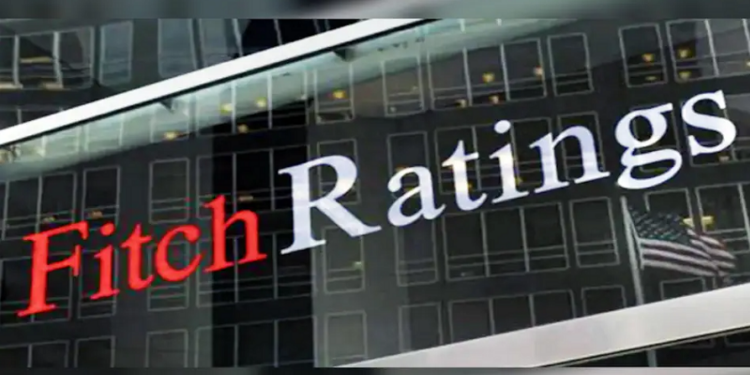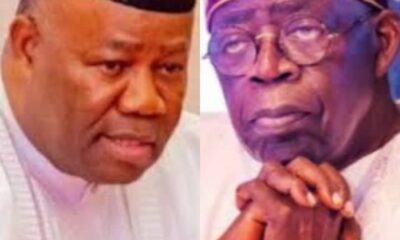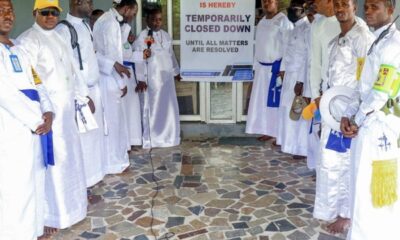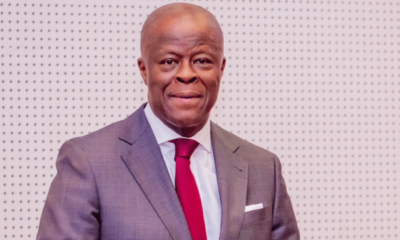Business and Brands
Fitch raises Nigeria’s credit outlook from stable to positive

Global credit ratings agency, Fitch, has revised Nigeria’s long-term credit default rating upward from stable to positive on the back of reforms in the foreign exchange market, oil industry and monetary policy over the past one year.
The agency noted that the upward revisions stem from actions of the Federal Government to bring about macroeconomic stability and improve credibility.
It listed some of the reforms informing its outlook as follows: adjustments in exchange rate and monetary policy frameworks, reduction in fuel subsidies, improved collaboration between the fiscal and monetary side of the economy, and reduction in Ways and Means borrowing and others.
- It stated, “Fitch Ratings has revised the Outlook on Nigeria’s Long-Term Foreign-Currency Issuer Default Rating (IDR) to Positive from Stable, and affirmed the IDR at ‘B-”
- “The Positive Outlook partly reflects reforms over the last year to support the restoration of macroeconomic stability and enhance policy coherence and credibility.”
- “The reforms have reduced distortions stemming from previous unconventional monetary and exchange rate policies, resulting in the return of sizeable inflows to the official foreign exchange (FX) market. Nevertheless, we see significant short-term challenges, notably, inflation is high, and the FX market has yet to stabilise, and the durability of the commitment to reform is to be tested.”
Furthermore, the report praised the Central Bank of Nigeria (CBN)’s role in eliminating distortions in the foreign exchange market, attracting foreign inflows into the market and monetary policy tightening.
However, the agency raised concerns over continued volatility in the forex market, elevated inflation levels and opacity on the true size of the country’s foreign reserves.
It also expressed worry over lagging oil production levels, the need to improve non-oil revenues and high interest payment occasioned by currency depreciation and increase rates of borrowing.
Backstory
Last year, the global ratings agency affirmed Nigeria’s credit outlook at stable on the back of recent reforms undertaken by President Tinubu on assumption into office. The outlook then raised concerns over the proposed $10 billion loan to offset the forex backlog.
Six months after the last revision, the Federal Government and the CBN have engaged in major policy reforms. During the period, the CBN cleared the backlog of forex forwards owed, increased the monetary policy rate (MPR) by 600 basis points and raised capital requirements for different tiers of banks across the country.
However, the period also saw a significant volatility in the forex market but increased foreign inflows on the back of high rates of return.
Also, crude oil production was below the budget benchmark of 1.75 million barrels daily during the first quarter of 2024 despite oil prices averaging around $80 per barrel during the period.
The Federal Government’s fuel subsidy payment gulped about $10 billion in 2022.


 News18 hours ago
News18 hours agoTINUBU, AKPABIO ALLEGEDLY ON WAR PATH OVER N687BILLION PADDED INTO THE 2024 BUDGET

 News12 hours ago
News12 hours agoKunle Afolayan finally reconciles with brother, Aremu at mother’s burial

 Top Stories11 hours ago
Top Stories11 hours agoCrisis Rocks Celestial Church In Lagos State Over Controversial N5million Donation

 Breaking News8 hours ago
Breaking News8 hours agoQueen Lateefah: Wumi Toriola brags as she breaks box office record

 Top Stories9 hours ago
Top Stories9 hours agoYahaya Bello: Betrayed By Trust, Redeemed By Choice By Abdul Mohammed Lawal

 Politics21 hours ago
Politics21 hours agoWhy Nigerians are in pain, difficulties amid Tinubu’s reforms – Edun

 News21 hours ago
News21 hours agoWike, G5 Governors Out To Destroy PDP – Rep Member Ugochinyere

 Top Stories21 hours ago
Top Stories21 hours agoTrump picks Scott Bessent, the ‘investor favorite,’ for Treasury secretary






